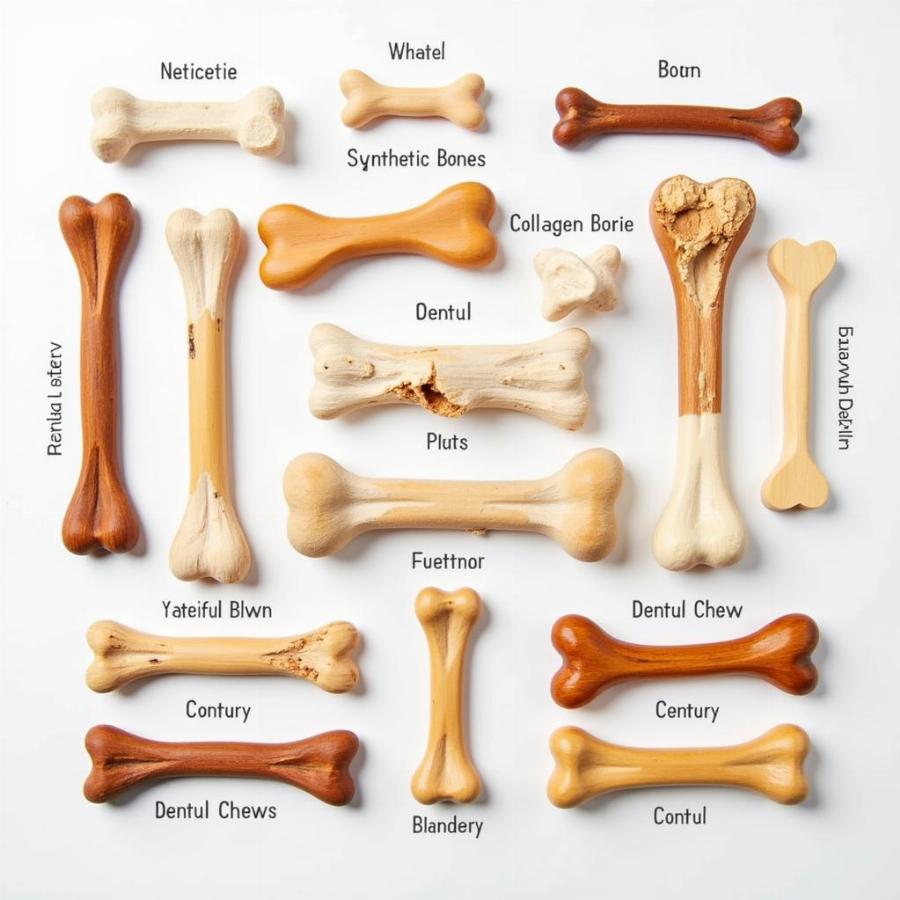Chew bones for dogs offer a range of benefits, from promoting dental health to providing mental stimulation. But with so many options available, choosing the right chew bone can be overwhelming. This guide will explore the world of dog chew bones, covering everything from their benefits to safety tips and choosing the best chew for your furry friend.
Why Are Chew Bones Beneficial for Dogs?
Chew bones satisfy a dog’s natural instinct to gnaw, which helps relieve anxiety and boredom. They also offer several important health benefits:
- Dental Health: Chewing helps scrape away plaque and tartar, promoting cleaner teeth and healthier gums. This can prevent dental disease, a common issue in dogs.
- Mental Stimulation: Gnawing on a chew bone keeps dogs occupied and entertained, reducing destructive behaviors born from boredom.
- Jaw Strength: The act of chewing strengthens jaw muscles, contributing to overall oral health.
Types of Chew Bones for Dogs
A wide variety of chew bones cater to different dog sizes, breeds, and chewing habits. Here’s a breakdown of some popular options:
- Natural Bones: These include raw marrow bones, soup bones for dogs, and other bones sourced from animals. They are a natural and appealing option, but require careful supervision due to potential splintering risks.
- Synthetic Bones: Made from durable materials like nylon or rubber, these bones are designed for long-lasting chewing and often come in various flavors and textures. They are a safer alternative to natural bones, especially for aggressive chewers.
- Collagen Bones: Collagen bones for dogs are highly digestible and offer a good source of protein. They are a softer chew, making them suitable for puppies and senior dogs.
- Dental Chews: Specifically designed to promote dental health, these chews often have textured surfaces or are infused with ingredients that help freshen breath.
Choosing the Right Chew Bone
Choosing the right chew bone depends on your dog’s size, age, and chewing habits. A small bone could be a choking hazard for a large dog, while a large bone might be too challenging for a puppy. Always consider these factors:
- Size: Choose a bone that is appropriately sized for your dog to prevent choking.
- Age: Puppies and senior dogs may require softer chews.
- Chewing Habits: Aggressive chewers need durable bones that won’t break easily.
 Different Types of Dog Chew Bones
Different Types of Dog Chew Bones
What are Safe Chew Bones for Dogs?
Not all chew bones are created equal, and some can pose safety risks. Avoid cooked bones, which can splinter easily and cause serious internal injuries. Safe chew bones for dogs are crucial for your dog’s well-being. Always supervise your dog while they are chewing and discard any bones that become small enough to swallow.
How to Introduce Chew Bones to Your Dog?
Introduce new chew bones gradually. Start with short supervised chewing sessions and gradually increase the duration as your dog becomes accustomed to the new chew.
Why Do Dogs Chew Bones?
Why do dogs chew bones? It’s a deeply rooted instinct, providing not only physical but also psychological benefits. Chewing releases endorphins, which have a calming effect and help relieve stress and anxiety.
Conclusion
Chew bones provide numerous benefits for dogs, including improved dental health, mental stimulation, and stress relief. By choosing the right chew bone and following safety guidelines, you can ensure a safe and enjoyable chewing experience for your furry companion. Remember to consider your dog’s individual needs and always supervise chewing sessions.
FAQ
- Are rawhide chews safe for dogs? While popular, rawhide can pose choking hazards and digestive issues. Consider alternatives like collagen or synthetic chews.
- Can I give my dog cooked bones? No, cooked bones are brittle and can splinter, causing serious internal injuries.
- How often should I give my dog a chew bone? This depends on your dog’s individual needs and the type of chew. Consult your veterinarian for guidance.
- What should I do if my dog swallows a small piece of bone? Contact your veterinarian immediately.
- Are antlers safe for dogs to chew? Antlers can be a good option for aggressive chewers, but they can also cause tooth fractures. Supervise your dog carefully.
- What are some good alternatives to raw bones? Synthetic bones, collagen chews, and dental chews are all safe alternatives.
- How can I tell if a chew bone is too hard for my dog? If your dog struggles to make an indent in the chew, it may be too hard.
More questions?
Check out these related articles on our website: raw marrow bones for dogs
Beaut Dogs: Your Ultimate Resource for Canine Companions
Beaut Dogs is your one-stop shop for all things dog-related. We provide expert advice, helpful tips, and a wealth of information on dog breeds, care, and much more. For personalized guidance and detailed answers to your dog-related questions, email us at [email protected]. We’re here to help you and your furry friend thrive! Visit us at https://beautdogs.com to learn more.